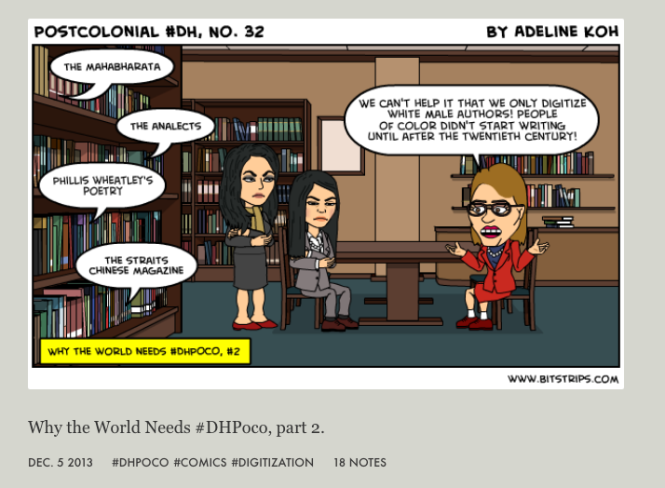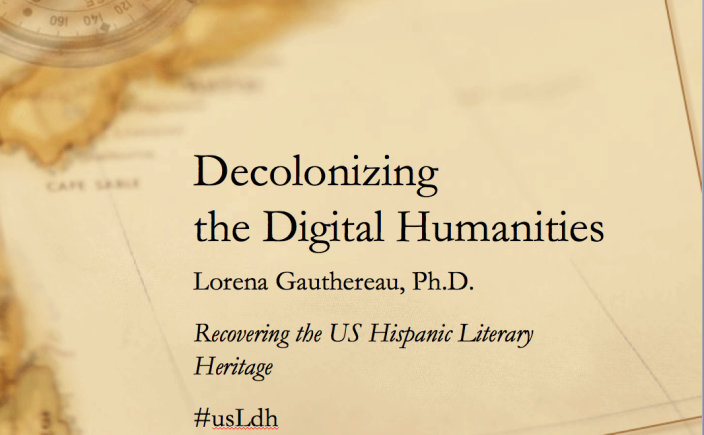This past week, I had the opportunity to give a talk as part of Recovering the US Hispanic Literary Heritage’s new US Latina/o Digital Humanities (#usLdh) Incubator series. If you missed it, you can access our group notes on Google Drive or Storify. I’ve also started a Zotero Group with a growing bibliography related to US Latina/o Digital Humanities (which includes sources on DH, decolonial theory, postcolonial theory, and more). Feel free to join and contribute to the growing bibliography!
My talk and this blog post are not meant as an in-depth analysis of decolonizing DH, instead, my goal is to provide a brief overview of the relationship between coloniality and the archive as well as a discussion of decoloniality not just as a theory but also as a methodology. This is meant to serve as a springboard for further discussion on decolonial DH methodology.
Colonialism, History, and Archives
In order to begin a discussion on decolonizing the digital humanities, I think it’s important to first acknowledge the role of colonialism in creating or shaping the historical record. Archives help structure knowledge and history. In terms of the nation-state, national archives help to create an authoritative national narrative. The International Council on Archives, for example, describes archives on their webpage as follows: “Archives constitute the memory of nations and societies, shape their identity, and are a cornerstone of the information society” (International Council on Archives n.p.). Yet, the shadow of colonialism more often than not penetrates this archivization process, determining whose stories belong in the archive and how to frame the national historical narrative. As Frantz Fanon wrote in The Wretched of the Earth (1963):
[C]olonialism is not simply content to impose its rule upon the present and the future of a dominated country. Colonialism is not satisfied merely with holding a people in its grip and emptying the native’s brain of all form and content. By a kind of perverse logic, it turns to the past of the oppressed people, and distorts it, disfigures it and destroys it. (Fanon 210)
Examples of distortion of history include the erasure of indigenous histories and languages, the recasting of winners/losers, the erasure of people of Mexican descent from the Texas side of the Texas Revolution, and—as recent political controversies have highlighted—the romanticization of the US Confederacy and the US Antebellum South. Colonization, complete with its indigenous genocide and African slavery robbed people of their lives, their freedom, their religion, their names, their culture, their lands, their language, and more. Marginalized archives, which contain the forgotten history of oppressed peoples (what Rodrigo Lazo calls “migrant archives”), “reside in obscurity and are always at the edge of annihilation. They are the texts of the past that have not been written into the official spaces of archivization” (Lazo 37). While not all DH projects are digital archives, DH projects do create a type of archive as they structure knowledge/history, tell historical stories, preserve parts of the archive, prioritize certain people/languages/epistemologies, and more.
Postcolonialism vs. Decolonialism
It is, of course, difficult to boil down two large theoretical fields, but for the purposes of this discussion, I wanted to provide simplified versions. Postcolonial theory critiques the formal colonial matrix of power. You can think of it as a “macro” critique. It looks at the big picture of colonialism. Decoloniality, on the other hand, tends to focus on the details, an awareness of how our quotidian experience is coded through coloniality. It attempts to delink our history (and our present) from colonial legacy by parsing out how coloniality is at work in our lives. The decolonize your diet movement, for example challenges people to become aware of the origins of dishes and to move away from overly-processed foods. An example of a decolonial DH project is The African Origins project, which reinserts the human into the history of colonial transatlantic slave voyages. This project is an effort to identify the names and origins of Africans that were forcibly transported across the Atlantic on slave ships.
Decolonial theory is influenced by Latin American Marxist Dependency theory, Négritude African diaspora intellectuals (such as Aimé Césaire), and WOC feminists. Decolonial theory is rooted in postcolonial theory, but challenges postcolonial studies for using European points of reference.
(Digital) Methodology of the Oppressed
Decoloniality lends itself to pedagogy and methodology in the way that it seeks to question history and hegemonic structures. M. Jacqui Alexander and Chandra Talpede Monanty (1997) comment: “Decolonization has a fundamentally pedagogical dimension—an imperative to understand, to reflect on, and to transform relations of objectification and dehumanization, and to pass this knowledge along to future generations” (xxviii-xxix). One of the ways that decolonial theory approaches such a dimension is through what Emma Pérez (1999, 2003) calls the “decolonial imaginary.” It is through the decolonial imaginary that we can push back against colonial legacies that structure our lives, the decolonial imaginary, writes Pérez (2003),
… can help us rethink history in a way that makes agency for those on the margins transformative….The colonial mindset believes in a normative language, race, culture, gender, class, and sexuality….I propose a decolonial imaginary as a rupturing space, the alternative to that which is written in history….How do we contest the past to revise it in a manner that tells more of our stories? In other words, how do we decolonize our history? To decolonize our history and our historical imaginations, we must uncover the voices from the past that honor multiple experiences, instead of falling prey to that which is easy—allowing the white colonial heteronormative gaze to reconstruct and interpret our past. (123, emphasis mine)
What, then, does coloniality, postcoloniality, and decoloniality have to do with DH?

Koh, Adeline. “Why the World Needs #DHPoco, Part 2.” #DHPoco: Postcolonial Digital Humanities Tumblr. no. 32. 5 Dec. 2013. http://dhpoco.tumblr.com/
Coloniality insists on the preference of Western ontologies and epistemologies and attempts to erase all non-Western forms of existing and knowing. It delegitimizes non-standard and non-Western languages and tries to put people and histories into strict categories related to language, nationality, gender, religion, etc. To approach DH from a decolonial methodology is to question whether your project reinforces coloniality/colonial thinking and to challenge yourself to delink your project from colonial structures.
Here are a few questions to ask yourself:
- Who?
- Who is being represented? Who is speaking? Whose history is it? Who is making the choices? Who is working on the archive? Who can access it? Who owns the items? Who houses them? Who is given credit for the work?
- What?
- What sort of items are being included? What types of knowledge are considered archivable? In what format/language are they? What is the medium/tool used to present/preserve/disseminate? What are possible ethical concerns?
- How?
- How are these choices being made? How are these items being categorized/tagged/labeled? How are they displayed?(Does it make sense to display this way?)
Another great resource for thinking through decolonial and postcolonial DH is the Social Justice and the Digital Humanities site, which emerged from a 2015 Humanities Intensive Learning and Teaching (HILT) course taught by Roopika Rosam and micha cárdenas.
You can enter into conversations about DH, decolonial theory, archives, and social justice on social media using related hashtags such as: #usLdh (US Latina/o Digital Humanities), #transformDH, and #DHpoco (postcolonial digital humanities).
Works cited
Storify PDF: Incubator: Decolonizing Digital Humanities
Lorena Gauthereau is a CLIR Postdoctoral Fellow at Recovering the US Hispanic Literary Heritage at the University of Houston. Find her online at https://lorenagauthereau.wordpress.com.

[…] Read full post here. […]
LikeLike
[…] the 20th century, this began to change. People from different backgrounds were writing history and making their voices heard. For instance, for a long time the history books […]
LikeLike
[…] the 20th century, this began to change. People from different backgrounds were writing history and making their voices heard. For instance, for a long time the history books […]
LikeLike
[…] ini mulai berubah pada abad ke-20. Masyarakat dari berbagai latar belakang berbeda mulai menulis sejarah dan membuat suara mereka […]
LikeLike
[…] ini mulai berubah pada abad ke-20. Masyarakat dari berbagai latar belakang berbeda mulai menulis sejarah dan membuat suara mereka […]
LikeLike
[…] ini mulai berubah pada abad ke-20. Masyarakat dari berbagai latar belakang berbeda mulai menulis sejarah dan membuat suara mereka […]
LikeLike
[…] Lorena Gautherau, ‘Decolonizing the Digital Humanities’, 20th November 2017, https://recoveryprojectappblog.wordpress.com/2017/11/20/incubator-decolonizing-the-digital-humanitie…; see also the article by Coker and Ozment cited […]
LikeLike